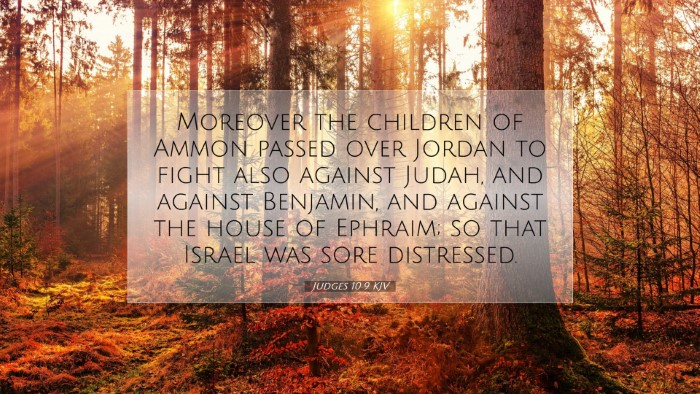Old Testament
Genesis Exodus Leviticus Numbers Deuteronomy Joshua Judges Ruth 1 Samuel 2 Samuel 1 Kings 2 Kings 1 Chronicles 2 Chronicles Ezra Nehemiah Esther Job Psalms Proverbs Ecclesiastes Song of Solomon Isaiah Jeremiah Lamentations Ezekiel Daniel Hosea Joel Amos Obadiah Jonah Micah Nahum Habakkuk Zephaniah Haggai Zechariah MalachiJudges 10:9
Judges 10:9 KJV
Moreover the children of Ammon passed over Jordan to fight also against Judah, and against Benjamin, and against the house of Ephraim; so that Israel was sore distressed.
Judges 10:9 Bible Commentary
Biblical Commentary on Judges 10:9
Verse: Judges 10:9 - "And they passed over Jordan to fight against Judah, and against Benjamin, and against the house of Ephraim; and Israel was sore distressed."
Introduction
This verse provides a glimpse into a tumultuous period in Israel's history, marked by internal strife and external conflict. The events described in Judges highlight the cyclical nature of Israel's faithfulness and rebellion towards God, and Judges 10:9 encapsulates this theme as it presents a significant moment of distress for the nation.
Historical Context
The Book of Judges is set in a time between the conquest of Canaan and the establishment of the monarchy. The Israelites repeatedly turned away from God's commandments, leading to oppression by surrounding nations. In the case of Judges 10:9, the Speaker (potentially the Ammonites) crosses the Jordan to engage in conflict with Israelite tribes - Judah, Benjamin, and Ephraim.
Commentary Insights
-
Matthew Henry's Commentary
Henry remarks on the seriousness of the situation faced by Israel. He notes that the war was instigated by the Ammonites, which serves as a divine judgment against Israel for their idolatry and unfaithfulness (Judges 10:6). Henry emphasizes that the enemies of God’s people often take the initiative of violence when they turn away from the divine order.
-
Albert Barnes' Notes
Barnes elaborates on the geographical and spiritual implications of the conflict. He points out that the reference to "passing over Jordan" signifies a significant crossing from safety to danger. The spiritual state of Israel was abysmal; they had forsaken God’s covenant, and as a result, they were susceptible to the threats of their surrounding enemies. Barnes highlights the importance of unity among the tribes of Israel, as internal divisions only exacerbated their plight.
-
Adam Clarke's Commentary
Clarke provides additional historical insight by considering the Ammonite aggression as a direct response to Israel's idolatry. He posits that distress often results from spiritual dereliction; when Israel turned to foreign gods, they set themselves up for calamities. Clarke notes that the lamentation of Israel comes from their own choices, which subsequently leads to the cry for deliverance to God.
Theological Implications
The passage underscores a critical aspect of Israel's history: the relationship between obedience to God and the consequences of sin. This passage serves as a reminder for contemporary readers of the constant need for vigilance concerning their spiritual lives.
-
Divine Sovereignty:
The events in Judges reveal God's sovereignty in the face of human rebellion. Even in their distress, God remains aware and responsive to His people's plight, preparing deliverance through judges.
-
The Nature of Sin:
Henry and Clarke emphasize how quickly the hearts of the people stray from God. This serves as a cautionary tale for believers, as complacency and spiritual apathy can lead to dire circumstances.
-
Community and Division:
Barnes’ reflections highlight the necessity of unity in the Body of Christ. Just as internal division weakened Israel, disunity in the Church can hinder its effectiveness in the world.
Modern Application
Judges 10:9 resonates with modern believers in several ways:
-
Self-Examination:
Christians are called to examine their lives for signs of spiritual decline. This verse serves as a wake-up call to seek genuine repentance and restoration with God.
-
Responsibility in Leadership:
For pastors and leaders, there is an imperative to guide their congregations towards faithfulness to God, balancing the need for both challenge and grace in their ministry.
-
Intercession:
The cry of Israel in distress reminds the Church of the power of prayer and intercession, lifting our voices for healing and deliverance within our communities.
Conclusion
Judges 10:9 serves as a poignant reminder of the consequences of turning away from God. Through the lenses of renowned biblical commentators such as Matthew Henry, Albert Barnes, and Adam Clarke, we find rich insights into the dangers of spiritual neglect and the hope of divine deliverance. As we reflect on this passage, may we be prompted to reaffirm our commitment to serving God wholeheartedly, recognizing the power of united action in faith.


